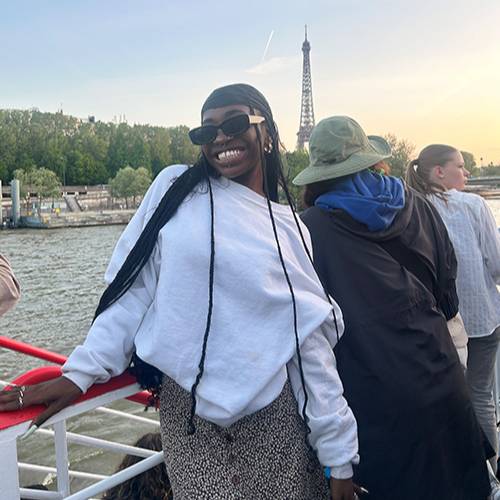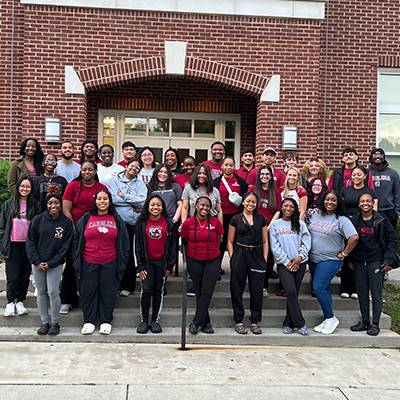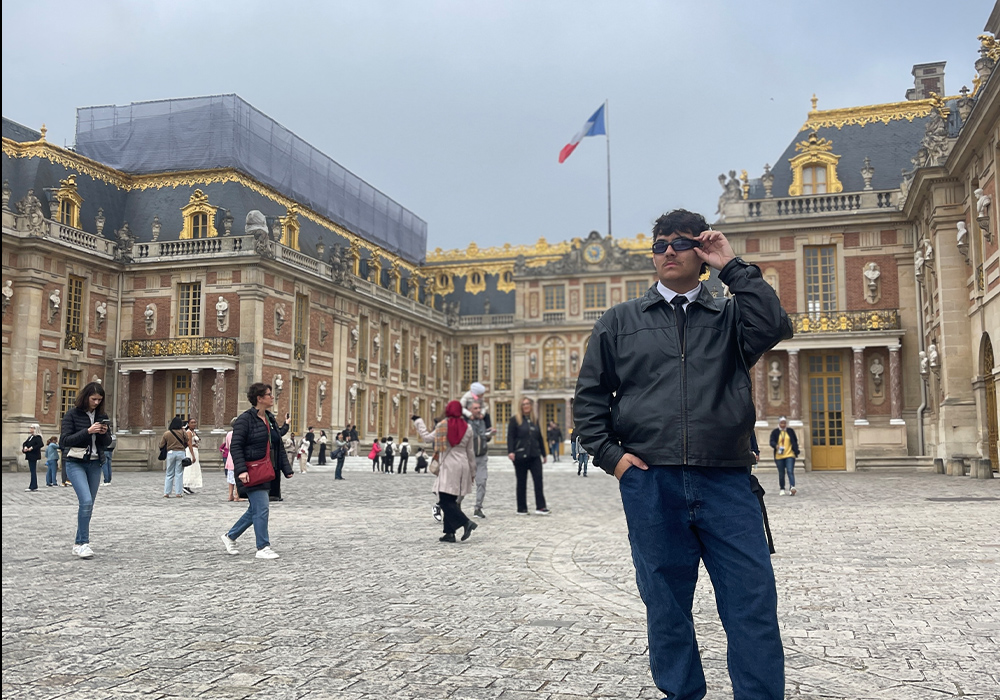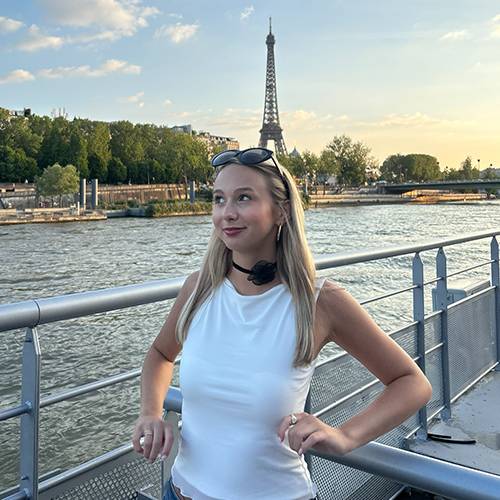When Kanyisile Barrett first learned of the Paris Maymester trip, she was intrigued. The course, Understanding African Americans in 20th Century France, promised students nearly two weeks in the City of Lights packed with visits to sites frequented by prominent African Americans during the Harlem Renaissance era.
The course is one of several African American studies Maymester sessions facilitated by Opportunity Scholars Program professor Florencia Cornet, but it was the first Barrett had heard of it. As a junior majoring in African American studies, the decision to go on the trip was a no-brainer. “I never really thought an African American studies trip would exist. I jumped on it right away,” she says. “I knew I had to go.”

Barrett’s peers had the same idea. The most recent trip organized for the Opportunity Scholars Program boasted its largest-ever enrollment of 33 students. Nationally, fewer than 10 percent of first-generation students study abroad, but Pell-eligible USC students have been bucking the trend since 2018 thanks to strong partnerships with the Education Abroad Office, the Center for Integrative and Experiential Learning and National Fellowships and Scholars Programs.
"[TRIO is] a grant-funded program, and for many years, you couldn't use grant funds to go abroad. Just recently, those regulations were re-interpreted. Before the regulations changed, we still wanted our students to have this experience, so that’s why we pushed them to all of these different avenues for funding," says Paulia Williams, Gamecock Guarantee Coordinator and trip planner. "We want first-gen students to have experiential education opportunities."
While Cornet was pleased to offer students a window into Parisian glitz and glamor, from French pastries to evening Seine River cruises, she was also eager to unearth parts of the city left out of mainstream tours.
A taste of Africa in France
Students knew when they signed up for the trip that they’d be learning about African American influence on Parisian culture. What most didn’t expect was that they’d find a whole new world embedded in the 18th arrondissement, a district known as Little Africa—also referred to as “the Drop of Gold.” Here, a mélange of African cultures have settled to live, work and share in the traditions of their homelands, representing France’s post-colonial legacy in contemporary Paris.

“In Paris, you see the glamour, but we were learning about the invisible and how Africans are treated,” says Deston Cedillo, a junior majoring in visual communications. “Parisian society has pushed these groups into this area, and they’re living in poverty because of colonization. It was really emotional. I have more of an appreciation for the strength and resilience of African immigrants in Paris and the importance of celebrating their achievements.”
Barrett, too, was moved by her experiences in Little Africa, and she enjoyed exploring new foods, different clothing styles and a different perspective of what Paris had to offer. She was particularly impacted by walking tours that brought the group to other historic sites around Paris, allowing her to walk in the footsteps of African American artists she admires: Josephine Baker, Langston Hughes and James Baldwin.
“Seeing the places that inspired them and the streets that they found peace in was like an out-of-body experience,” Barrett says. “One place, Shakespeare and Company, was the only bookstore in Paris that had only English books and a lot of African Americans like James Baldwin and Langston Hughes went to Shakespeare and Company and they stayed upstairs in the attic. They had a bed and a cool nook where they could write their books. James Baldwin wrote Go Tell It on the Mountain there, which is one of my favorite books by him. Being in that space was so cool.”
Intercultural development
In planning the Paris trip, Cornet was determined that students return to USC with a deeper understanding of their own cultural identity and how they interact with the world. Part of that was helping guide students not to become overly fixated on similarities between Paris and home to the point that they missed opportunities to learn.
“The whole point is to see difference, respect difference, accept difference and be comfortable with difference, because when they go out in the real world, they’re going to have to deal with everyone,” says Cornet, a Ph.D. scholar in comparative literature and the African diaspora. “The way you communicate interculturally is extremely important.”
Students also got a better chance to understand the racial climate in Paris through the decades. For stars like Josephine Baker, a world-famous Vaudeville performer and World War II-era spy for the French military, Paris was a refuge. Fleeing to the outskirts of the city, she was able to make a life for herself as a Black woman whose legacy still looms large in her adoptive city.
“Learning about Josephine Baker was really big for me, seeing how she started her career from nothing and lived as an African American in Paris,” Cedillo says. “She was really strong, and it was really touching. The trip helped me to be more empathetic, think more inclusively and dig deeper to listen to voices that aren’t heard.”
Looking to the future
For both Barrett and Cedillo, the future is looking increasingly international.
Barrett, who has long aspired to earn a Ph.D. in African American studies and learn more about lesser-known women, gained additional clarity on what her educational path may look like. “I want to explore more of the global African American history,” she says. “It’s never really talked about in classes, about when people go outside of the U.S. and what they do there and what they bring back. I want to discover more and see what’s out there.”
Cedillo has a passion for fashion photography. Traveling to Paris confirmed a desire to look for international work opportunities, a thought that surfaced on his first trip abroad -- TRIO’s previous psychology Maymester in Cuba.
“It would be really cool to travel while I work. I’d like to do traveling photography or working for companies outside the U.S.,” Cedillo says. “Immersing myself in these cultures really opened my eyes. It’s just life changing.”
Join the Opportunity Scholars Program Oct. 22 to hear from a panel of students who traveled to Paris this May and take a look at their cultural exchange quilt projects.

